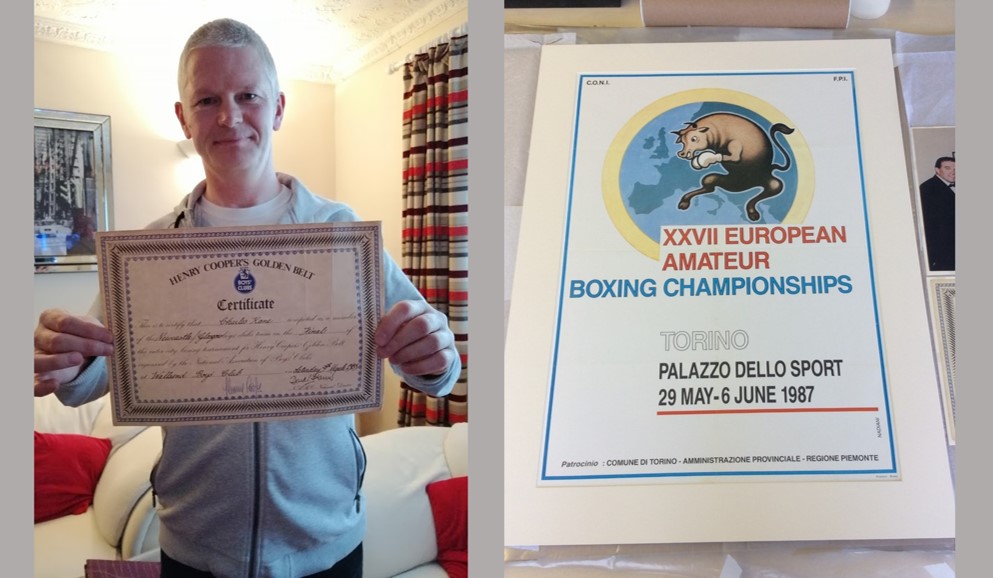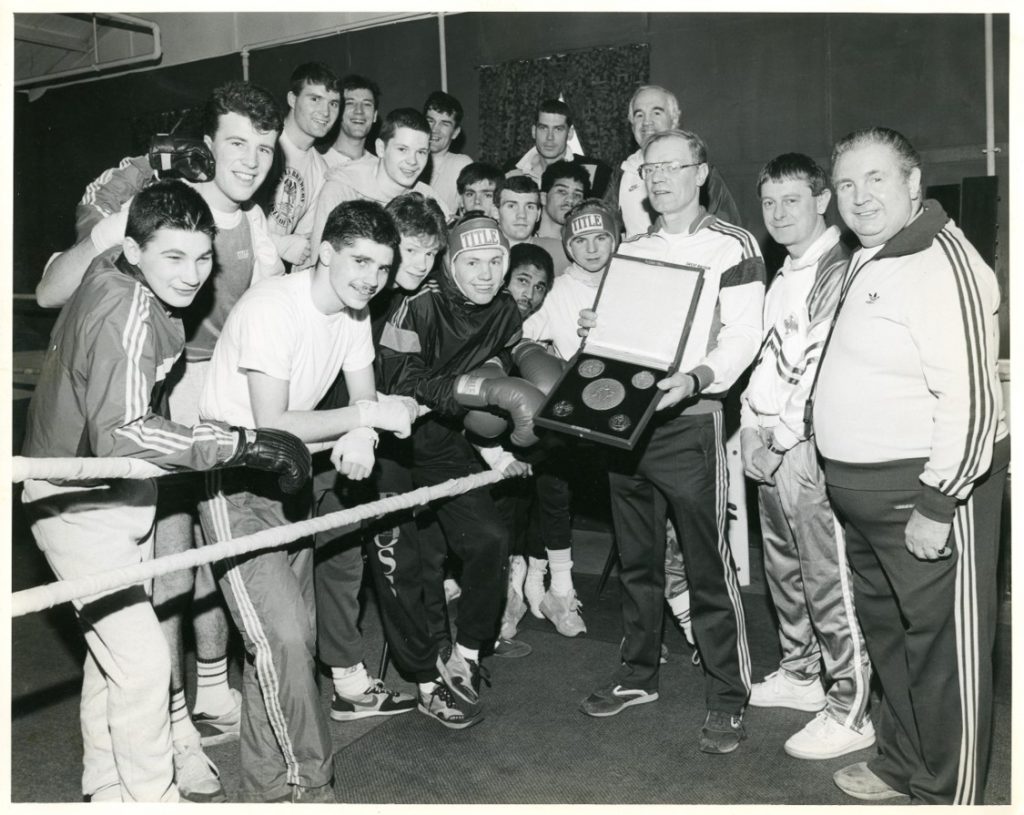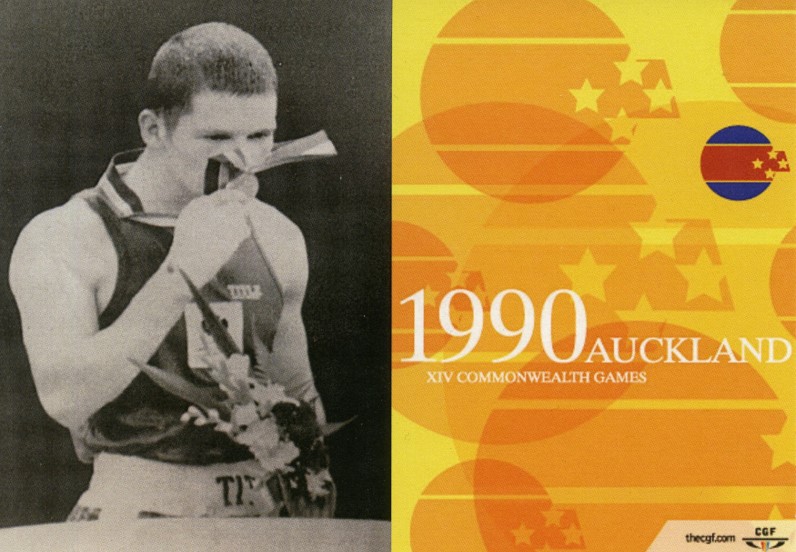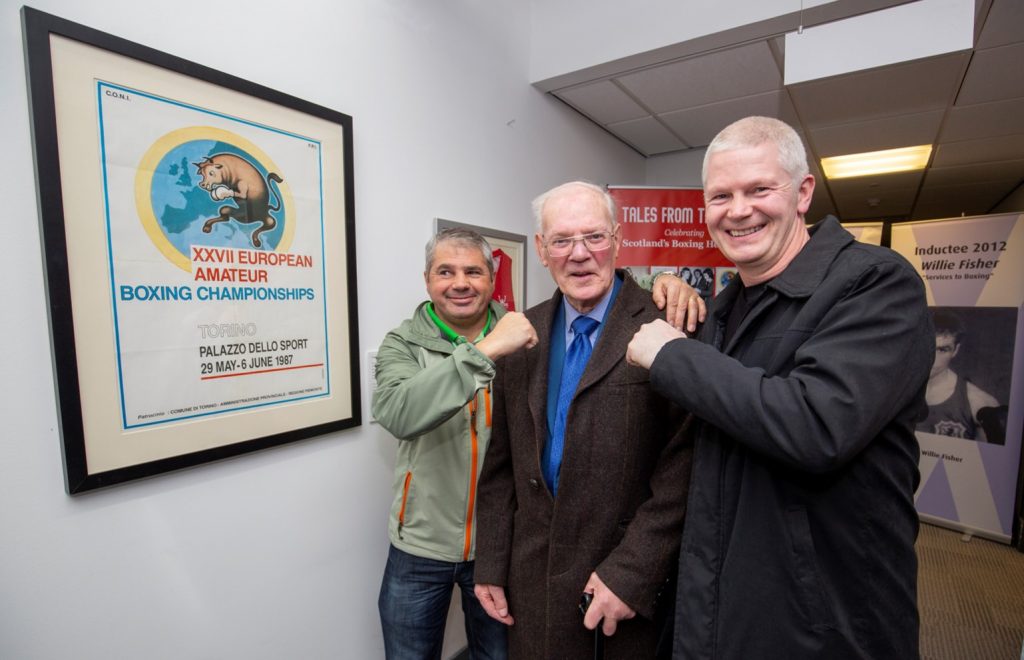Henry Cooper Golden Belt Certificate
For Charlie Kane, a young unemployed lad from Clydebank, the desire to be a successful boxer was shaped by the support and encouragement he received from Jimmy Creswell, his coach at Antonine Boxing Club, Frank Hendry, Secretary, Scottish Amateur Boxing Association and Dick McTaggart, National Team Coach, Scottish ABA. All three men had their own input into Charlie’s amateur career, which saw him develop from a promising youth club boxer to Commonwealth Games Gold Medallist. The story begins in the English city of Chester, where Charlie got into Boxing at a young age by going along to the local boxing club with his friends.
At the age of 14, Charlie’s family moved back to Scotland and settled in Clydebank. Charlie was keen to continue to box and wanted to meet new friends, so decided to go along to Antonine Boxing Club, where he came under the guidance of his first mentor. Jimmy Creswell, a former professional boxer, was head coach, and he encouraged Charlie to take part in bouts for novice boxers that were held at the Palace of Arts in Glasgow.
All the novices in the West of Scotland used to meet up there on a Sunday afternoon. We’d all weigh in and they would try and match us up there and then. I had about seven or eight contests at the Palace of Arts and was lucky enough to win them all.
Charlie Kane (2019)
In May 1983, Charlie won his first boxing title, the Strathclyde Community Education Service Boxing Championship (44kg competition) at the Palace of Arts. As a young boxer Charlie gained experience at a number of competitions and tournaments including the Boys Club of Scotland Championships (which he won), Scottish National Youth Championships and Western District Youth Championships. In December 1984 he faced four bouts in the space of eleven days. He won three of the bouts, the only defeat coming against Drew Docherty, who would soon become a Scotland teammate, at a Boxing show in Croy.
“I was only sixteen when I fought Drew Docherty. I was a flyweight going on bantamweight. Drew was a seasoned campaigner. He’d fought for Scotland by that point and I gave him just as good as I got. He got the decision and we got the best fight.”
Charlie Kane (2019)
Charlie was one of many young boxers to feature on Henry Cooper’s Golden Belt, a programme broadcast on ITV in which Cooper hosted a Boy’s Club boxing tournament. Aged 16 Charlie featured in a bout against Kevin Hodgkinson of Liverpool. Charlie won the fight on points and was presented with his medal and winning certificate by Cooper.
“It was great to be involved in the competition, it was the first time I’d been on TV and I got to meet Henry Cooper”
Charlie Kane (2019)

European Boxing Championships poster
On April 26th 1986 Charlie made his international debut for Scotland in a match against Denmark. He had come to the attention of the selectors after impressive performances in the Western District and Scottish ABA National championships. He got his international career of to a great start with a first-round stoppage win over Lars Nourikson. This impressive debut marked Charlie down as a candidate for the Scottish boxing team to compete at the Commonwealth Games and the European Junior Championships.
Attending training camps at Rosyth Naval base Charlie benefited from the knowledge and experience of Dick McTaggart and Frank Hendry. Charlie bore a lot of similarities to Dick McTaggart in his youth, both men were southpaws and were tall for their weight.
Charlie was still a few months off his 18th birthday when he received a confirmation letter that he had been selected to compete for Scotland at the 1986 Edinburgh Commonwealth Games in the featherweight division. Charlie was absolutely delighted to represent his country but his joy was soon dampened when it was announced that the Games were being boycotted by African and Caribbean nations due to the UK Governments refusal to implement economic sanctions against the South African Government and its Apartheid regime. Charlie lost his first round bout against Chris Carleton (Northern Ireland) in controversial circumstances. Confusion reigned as the referee mixed up the buzzer signalling the end of the round for the buzzer used for the count.

Undeterred by his first experience of the Commonwealth Games Charlie prepared for to the European Junior Championships in Copenhagen. In the first round he was drawn against one of the favourites Sylwester Slobodzian of Poland.
“He {Sylwester] was one of the favourites for the competition. I completely out boxed him and won comfortably. In the next round I was drawn against a Frenchman and I was rubbish and he beat me convincingly. That’s boxing.”
Charlie Kane (2019)
Charlie continued to gain experience fighting at international level with a trip to Turin as part of the Scottish team competing in the 1987 European Championships. The striking championship poster kept by Charlie as a souvenir of the event features in the Tales from the Ring exhibition.
Commonwealth Gold

In 1988 Charlie was part of the Great Britain team that competed at the Seoul Olympics. Fighting in the lightweight division Charlie reached the quarter finals and remains the last Scottish boxer to fight at Olympic level.
The highpoint of Charlie’s career was reached in 1990 when he ended a twenty year wait for a Scottish boxing gold at the Commonwealth Games. With Frank Hendry and Dick McTaggart again in his corner Charlie won gold in the Light-welterweight division, defeating Nicodemus Odore (Kenya) in the final.
“Its only now when I look back at what I achieved in my career that I realise how significant this [Commonwealth gold] was, but at the time I really didn’t realise what I’d achieved at that moment. I can remember while waiting on the decision, I was saying to myself please god, please god let it be me.”
Charlie Kane (2019)
After his Commonwealth Games success Charlie faced the quandary of what to do next. He was 21 years old and had been unemployed since leaving school. He opted to turn professional under the guidance of his club coach Jimmy Creswell. In hindsight Charlie admits:
“I should never have turned professional because in the end it was not a good decision. I was professional for nearly ten years, yet I only had 19 professional bouts. I never really knew when I would be boxing. If we had had the arrangements that they have now where boxers are regularly meeting in competitions that might have been a better scenario. When I was an amateur I knew when I would have competitions and I felt that I could have gone to the Barcelona Olympics [in 1992] – yeah, being a double Olympian from Clydebank would have been a nice achievement.”
Charlie Kane (2019)
In 1976, English playwright Barry Hines wrote “Two men from Derby”. The play is about Dick Hayes, a young footballer from the North-East If Hines had decided to rewrite the play twenty years later, he could have re-titled it “Two Men from Dundee”, set the play in 1980s Clydebank, changed the sport to boxing and renamed the lead character Charlie Kane. While the outcome of unfulfilled potential could be seen by some as a common theme, the difference between the lead characters would have been Charlie’s desire to be a successful professional boxer, just as he had been in his amateur career.
Ian Mackintosh, Project Officer.
